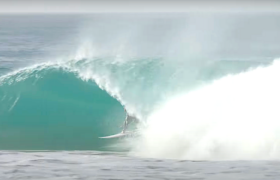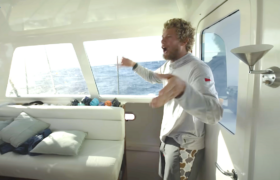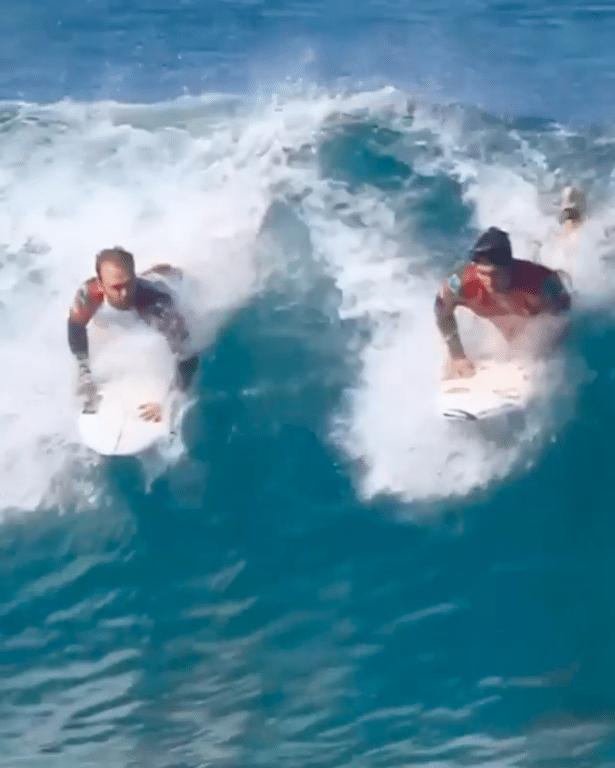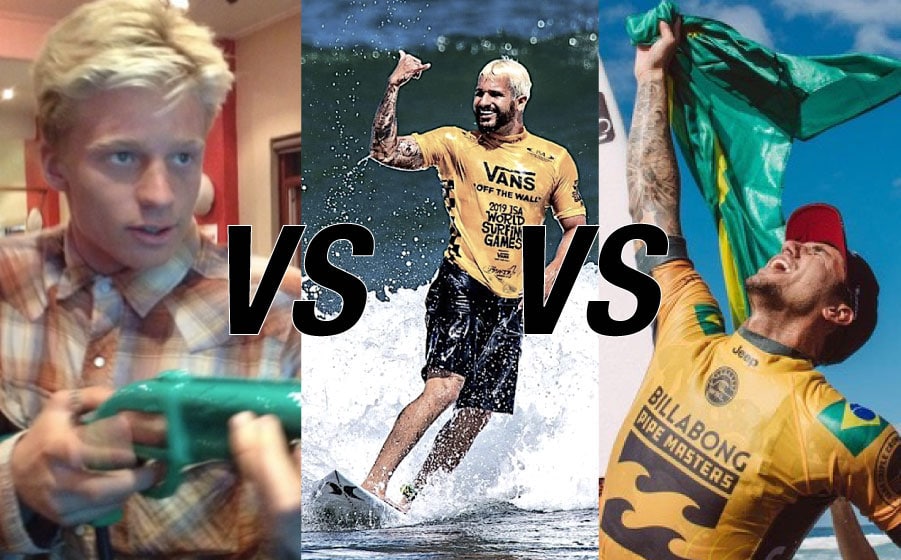Beats Kelly Slater, Gabriel Medina, wins Pipe Masters, world title.
Minutes ago, on an overcast eighty-degree afternoon at Banzai Pipeline, the little boy from a remote town in north-east Brazil who was too poor to buy a surfboard so learned to surf on a drink cooler’s foam lid, was crowned surfing champion of the world.
Italo, who survived a win-at-all-costs challenge from defending world champ Gabriel Medina, was flawless throughout the event, his pace seldom slackening despite an injured elbow, eventually winning his first Pipe Masters.
“I can’t imagine,” Italo wept, afterwards. “This is coming to my grandmother. She passed away two weeks ago in Europe. She was stoked for me to do it. So I did. God gave me this.”
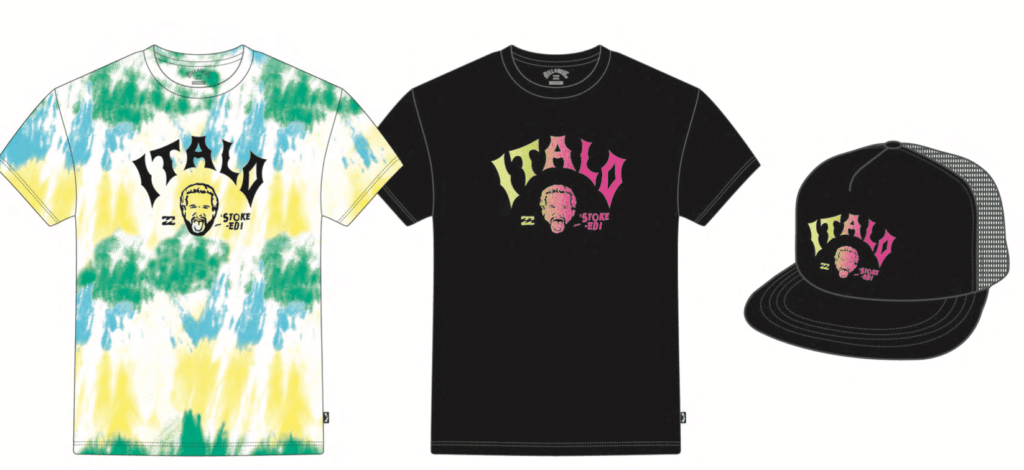
Italo Ferreira, who is twenty-five years old, grew up and still lives in the beachside hamlet of Baía Formosa; a joint where the only paved roads are the ones that lead into the village.
Italo’s daddy would wander the beach and buy the catch of local fisherman, selling the fish to restaurants. His skinny son wanted to surf so Pops gave him the foam lid from the box he kept his fish in.
The rest, the elevation to stardom, came quickly
In 2014, Dino Andino, daddy of one of the other contenders at Pipe, went up to Timmy Patterson, who’s been making Italo’s boards since he was fifteen, and said, “Who is that Italian guy? He’s doing floaters on eight-foot closeouts on grinding beachbreaks and making ‘em. He’s going to be on tour next year. That guy’s a freak.”
Dino knew.
Italo was rookie of the year in 2015, won three events and almost the title in 2018 and, this year, two events and the title. Italo is now the third Brazilian in four years, after Adriano de Souza and Gabriel Medina, to be crowned world champion.
In May, I spent two days with Italo and his girlfriend Mari as he prepared for the Margaret River Pro and as he struggled to erase the spectre of Great White death from his head.
On day two, I recorded this interview.
DR: I want to talk to you, first, about Bells this year. You’re the defending champ and the world number one after winning Snapper. First, you get thrown against the Winkipop cliffs, your apparent drowning broadcast live, then you get called on the most technical interference I’d ever seen, an overly punitive response. Talk to me.
Italo: The interference? When Jordy dropped into that wave he was in the whitewater and I saw clean face for him. I got out of the wave and I was, like, this is not an interference. After I got to the outside I heard, “Italo, you just got an interference against Jordy.” I was, like, fuck those guys. Later, I saw the photo of Jordy on his stomach and holding his board in the whitewater and I’m pulling off the wave ten metres away.
Mari interjects that it was a new rule and in this instance it was the first time it had been exercised in competition.
Italo: All the Brazilians do crazy things so they’re always trying to change (the rules) ‘case we’re always so hungry. We do everything to win! That’s why the rule changed.
DR: In this instance, it was Jordy, a South African, who did everything to win when he spun around in the dirt. A very Slater-at-HB sorta move.
Italo: He tried to play the game with the rules.
DR: Were you ready to swing when you came in?
Italo: Yeah. I punched the locker and broke everything. I almost broke my fingers. That’s how I put all the negative things off. By punching back!
DR: Is it painful for you to lose?
Italo: I feel a lot of pain.
DR: There’s an arresting photo of you, in tears, on the stairs at Bells, Mari comforting you. That was after your brush with mortality at Winki, yeah? Tell me that story.
Italo: The wave smashed me and my board hit me in the face. I was under the water for thirty seconds. When I came up I saw the jetski coming but there was a set behind it and he couldn’t get me. That’s why I think to paddle to Winki. I catch the whitewater and go to the stairs there. I was standing there and someone say, the ski is coming, so I jump back in the water but then another set came and it was hard for the ski to come back.
Mari: No one was talking about it! Nothing! I was asking the other guy, the microphone guy, “What about Italo?’ The jstski was on the outside and no one was on the inside!
DR: How were you feeling, so close to the beach, the crowd, but also so close to being skewered in front of 10,000 people?
Italo: I was trying to breathe, to stay relaxed, but I was nervous because I didn’t know what was going to happen. After that, I asked the locals and they said, one guy dead at that place, many many years ago.
Mari: The first thing he told me was, “I thought I was going to die” and then he started to cry. It was crazy.
Italo: That’s why I’m staying on the stairs, without energy, nothing. I can’t feel the legs. I stayed there and tried to breathe.
DR: Who are you and what is your life like?
Italo: It’s a quiet life; I do nothing crazy. I don’t like parties and these things. I just like to wake up early and surf and get a good breakfast and back to the water again. When I go home to Baia Formosa, I don’t have a lot of time there so I try to enjoy every single moment. I surf and I film and I have a quad bike so I can do crazy things on the beach. I have a sports car, too.
DR: Describe growing up in a little Brazilian surf town.
Italo: I start to surf eight, nine, years old. I was, like, a fast learner because we have nothing to do there.
DR: What was your first surfboard?
Italo: I didn’t start with a surfboard. My father buys fish to sell at the restaurants and, because I was so small and so skinny, I was able to surf with the foam lid from a box. After that, a friend gave me a board and then I started to compete. I start to win these contests and I tried to win cars, motorbikes, tickets to fly overseas.
DR: How long do you surf in a session?
Italo: It used to be for three or four hours. Now I try to surf for one-and-a-half hours to save my body for the contest. Those things are a marathon. I’m not the crazy guy I used to be in the past. Instead of one five-hour session, I have four surfs in one day. I think it works better.
DR: How many waves will you catch in one hour?
Italo: Maybe thirty, thirty-five. I catch a lot of waves. I always try to get away from the crowd so I can catch waves because I like to surf and not sit there. I don’t like places like Margaret River where there’s just one peak and you only catch one wave in thirty minutes.
DR: Do you remember your first air?
Italo: I can’t remember because I’ve done a lot. All the guys from the north-east of Brazil, the first manoeuvre you learn is the air because we have small shirty waves. One foot, strong wind, so you stand up, go fast and do an air. That’s why Brazilians have more of a facility to do airs and it’s why we have a problem with barrels and big turns.
DR: What you do with your money? Half-a-mill in prize money from the past year or so alone ain’t a bad windfall.
Italo: The first thing I did when I started to get money was to buy a hotel and a restaurant for my dad and my mom. Now I just think about my future because I’ve taken care of them.
DR: Why do you think you can win a world title?
Italo: Perseverance. And I have the talent. I have a piece of paper with all my goals written on it. I can’t show it now but when I get a world title, I’ll put a photo of it on Instagram.
DR: How often do you look at it?
Italo: When bad things happen I go there and look at the paper and it puts my mind on the way again.
